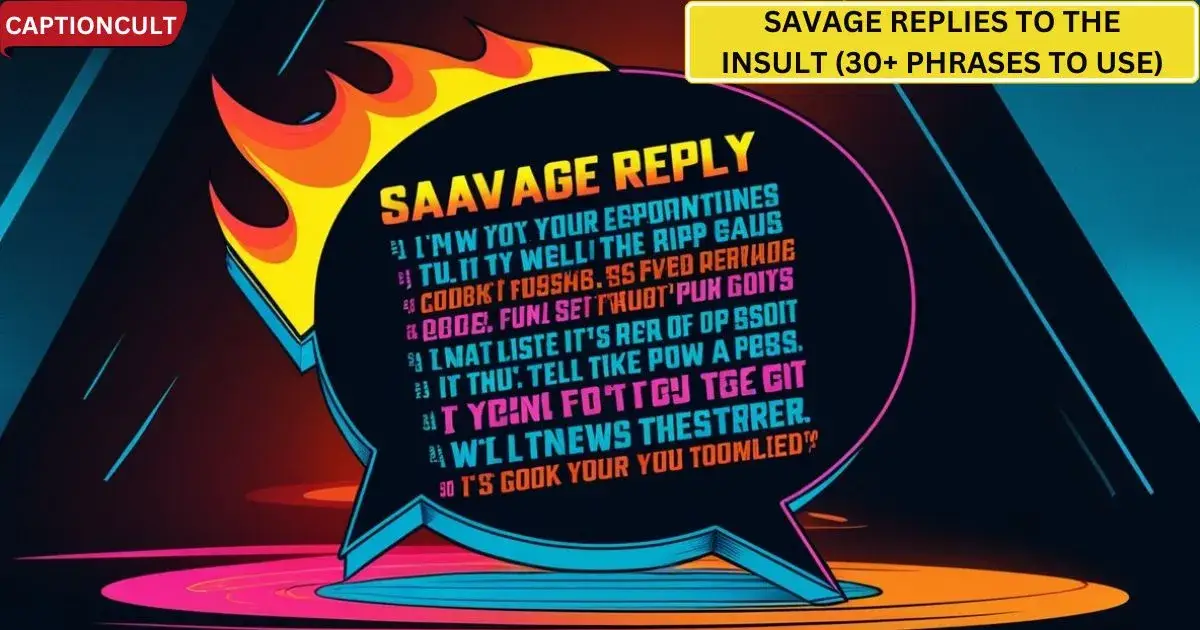Responding to insults can be tricky. It requires a delicate balance of self-preservation and social grace. A poorly chosen response can escalate a situation, while a well-crafted savage reply to insults can disarm your attacker and even win you respect. This article explores the art of how to give a savage reply when someone insults you, providing you with a toolkit of savage replies to insult that are both effective and insightful.
Understanding the context and choosing the right approach is crucial. Whether facing a bully, dealing with a sarcastic friend, or navigating a tense professional environment, the appropriate savage reply to insults can be a powerful tool. This guide aims to equip you with the skills to handle such situations with confidence and grace. We’ll cover savage replies to insult text, savage replies to insult in English, and other scenarios.
Why Choosing the Right Response Matters
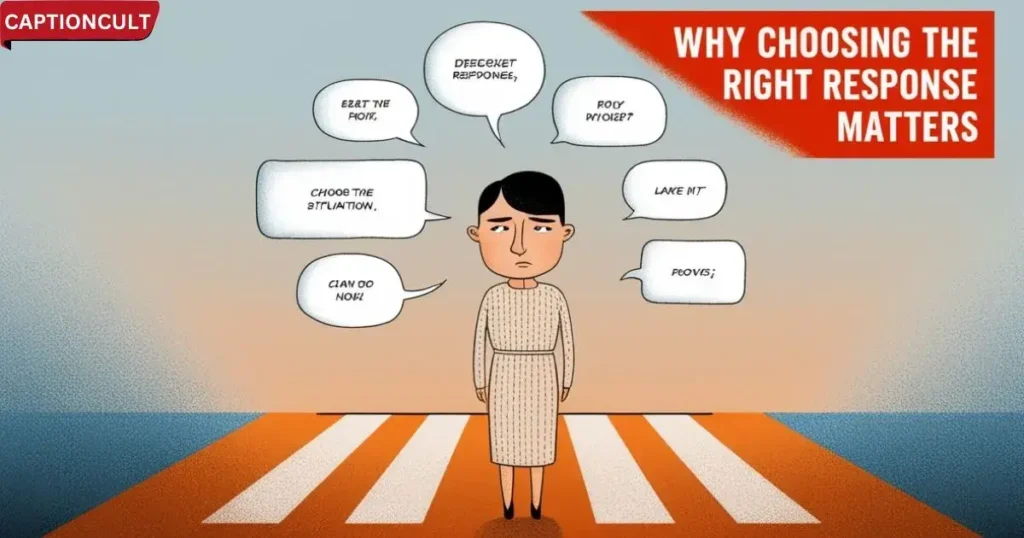
Before diving into specific savage replies to insult, it’s vital to understand why responding strategically is crucial. An inappropriate response can lead to several negative consequences:
- Escalation of conflict: A harsh or aggressive savage reply to insults can escalate the situation, leading to further arguments or even physical confrontation.
- Damage to relationships: A poorly chosen response can severely damage personal or professional relationships, especially if the insult was unintentional or stems from insecurity.
- Emotional distress: Allowing insults to go unanswered or responding poorly can leave you feeling hurt, angry, and frustrated.
- Negative perception: Others might view you negatively if your response seems disproportionate or immature.
Conversely, a well-crafted savage reply to insult can demonstrate your confidence, wit, and ability to handle challenging situations effectively. It can also help you set boundaries, assert yourself, and even diffuse tension.
35+ Savage Replies to Insults: A Comprehensive Guide
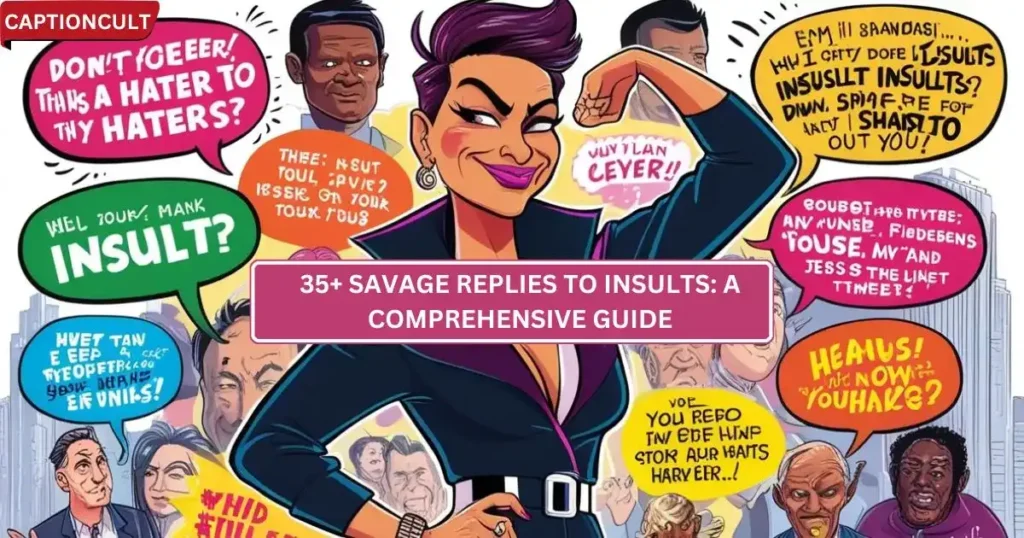
This section offers a wide range of savage replies to insult, catering to various scenarios and personalities. Remember, the best savage reply when someone insults you depends on your personality, the nature of the insult, and your relationship with the insulter. It’s crucial to consider the context before unleashing a savage reply to insults.
General Savage Replies to Insults:
- “Is that the best you’ve got?” (Suitable for mild insults or when you want to show dismissiveness. A classic savage reply to insult for those who want to deflect the attack with quiet confidence.)
- “I’d rather be me than you.” (This savage reply to insult emphasizes your self-acceptance and points out the other person’s lack of self-esteem.)
- “Oh, I’m sorry. Did I accidentally step on your ego?” (A playfully sarcastic savage reply to insult for those who value wit and humor)
- “Thanks for your opinion, but I’m not interested.” (A simple yet powerful savage reply to insults, appropriate for all kinds of insults)
- “Wow, that’s an original insult. You must be very proud of yourself.” (Sarcastic and dismissive. This savage reply to insult exposes the lack of creativity in the attacker.)
- “I’m not even mad, just disappointed.” (This savage reply when someone insults you implies that the insult is beneath your response, which is always effective in deflecting insults.)
- “Bless your heart.” (This simple phrase is effective because it expresses both pity and a dismissive tone, working well as a savage reply to insult for when you don’t want to engage further.)
- “Is your brain made of sponges? Because it seems to soak up every negative thing.” (A more aggressive but still witty savage reply to insult, especially when the attacker’s comments have no basis.)
- “I’m sorry, is this your attempt at humor?” (Suitable when you don’t want to respond to the insult directly, thus using it as a savage reply to insult text or in person.)
- “I’m sure that insult was well-rehearsed.” (This savage reply to insults shows that you recognize that the attacker’s words are an act of provocation.)
- “Did someone hurt you today? Because your attitude seems to reflect that.” (Works as a savage reply to insult text or in person.)
- “I’ve got more important things to do than respond to your negativity.” (This savage reply to insult lets the insulter know you don’t value their insults enough to give them a more direct response.)
Savage Replies to Insults for Specific Scenarios:
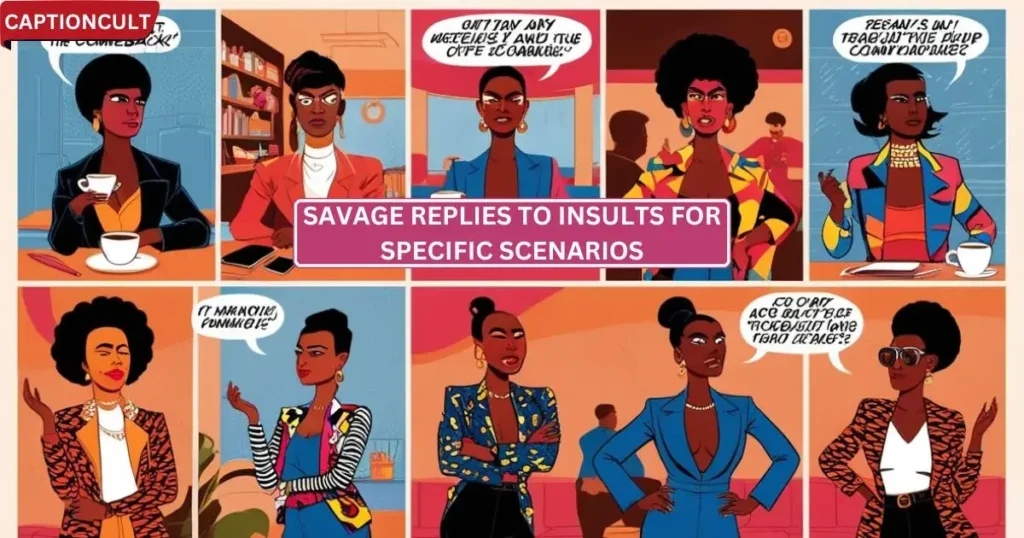
- For bullies: “Your attempts to bring me down are actually quite comical. Do you need a hug?” (This savage reply to insults shows that you aren’t fazed by their attempts at bullying.)
- For sarcastic remarks: “You’re so clever, you’ll be the best at telling jokes while you stand alone.” (Sarcasm is best met with sarcasm. This is a savage reply to insult that strikes back with a witty comeback)
- For personal attacks: “That’s nice of you to share your personal observations, I’ll consider them.” (This savage reply when someone insults you lets the insulter know that their attacks have failed to provoke a reaction.)
- For jealousy-driven insults: “You might have to lower your standards if you intend to compete with me.” (An assertive savage reply to insults, ideal for those who want to convey superiority and dominance.)
- For insults delivered in a group: “I see that your attempt at making yourself feel better by putting me down has failed.” (This savage reply to insult emphasizes the insecurity of the attacker.)
- For online insults (savage replies to insult text): “That’s very insightful. Thanks for clarifying the absence of your critical thinking.” (This savage reply to insult text is excellent when dealing with a troll. It’s both sarcastic and condescending.)
Witty & Humorous Savage Replies to Insults:
- “I’m not sure what’s tighter, your jeans or your vocabulary.” (A playful savage reply to insult appropriate for light teasing among friends.)
- “If you were a vegetable, you’d be a rutabaga.” (A humorous savage reply to insult if you’re looking for a funny jab to throw back at the attacker.)
- “I’ve had worse days.” (A simple yet effective way to show that the insult is not impactful; works as a savage reply to insult text or in person)
- “Wow, that’s creative. Maybe you should pursue stand-up comedy.” (A playful way to respond to an uninspired insult; works as a savage reply to insult text or in person)
- “I’m not arguing with you. I’m just letting you know that I have a brain.” (A smart savage reply to insult used when the attacker’s comments are unfounded.)
- “Is that what they call a personality? It’s a poor attempt at one!” (This savage reply to insult uses humor to point out the lack of personality in the attacker.)
More Direct & Assertive Savage Replies to Insults:
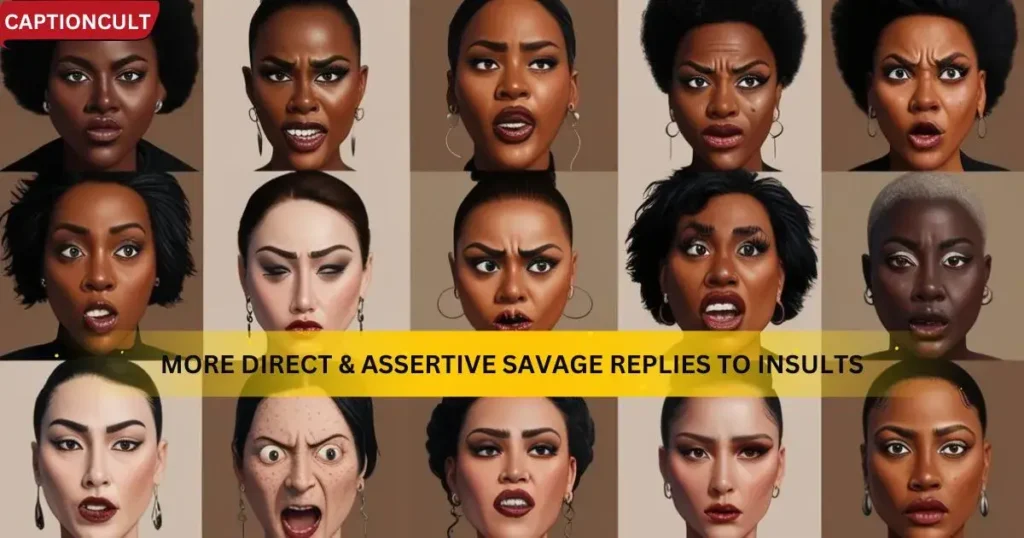
- “Your opinion is not welcome here.” (A direct savage reply to insults that sets a firm boundary.)
- “I’m not interested in your negativity.” (This direct savage reply to insult emphasizes the rejection of the attacker’s words.)
- “Your words have no impact on me.” (An assertive way to show confidence; use as a savage reply to insults or a savage reply when someone insults you.)
- “Kindly keep your comments to yourself.” (A polite but firm way to express your dislike of the other person’s comments; ideal as a savage reply to insult when you are trying to be civil.)
- “Learn to argue with more substance.” (This savage reply to insults tells the attacker that their insult lacks credibility.)
- “Try to express yourself better next time. You’re making a fool of yourself.” (This savage reply to insults criticizes the attacker’s manner of communication and insults their intelligence.)
- “If that’s the best you can come up with, I feel sorry for you.” (A direct savage reply to insults that shows pity toward the attacker.)
Savage Replies to “Shut Up”:
- “Is that all you have to offer? Very clever.” (This savage reply to shut up uses irony and sarcasm to make the insulter look foolish.)
- “Why would I stop talking? I’m having such a blast.” (This savage reply to shut up turns the situation into a playful one by ignoring the initial insult and continuing the conversation.)
- “Why don’t you try engaging instead of just telling me to shut up?” (This savage reply to shut up encourages better communication and challenges the insulter’s approach.)
- “Says the one who is constantly running their mouth.” (This savage reply to shut up is a direct way of deflecting the insulter’s attempts to silence you.)
- “I am only shutting up after you offer a more valuable contribution to our conversation.” (This savage reply to shut up challenges the insulter to start a healthy discussion.)
How to Give Savage Reply When Someone Insults You
Responding to insults with a savage reply requires wit and composure. Before reacting, take a breath and assess the situation. A dismissive “Is that the best you’ve got?” can deflate a petty insult. For more aggressive attacks, a sarcastic “Wow, original” highlights their lack of creativity. Humor can be effective; a witty comeback can disarm the attacker.
However, avoid escalating; aim for a response that’s clever but not hurtful. Consider your relationship with the person; a close friend might warrant a playful jab, while a stranger needs a firm boundary. Ultimately, the best savage reply depends on context, but confidence and quick thinking are key. Remember, sometimes silence is the most powerful response.
Understanding the Psychological Landscape of Savage Replies
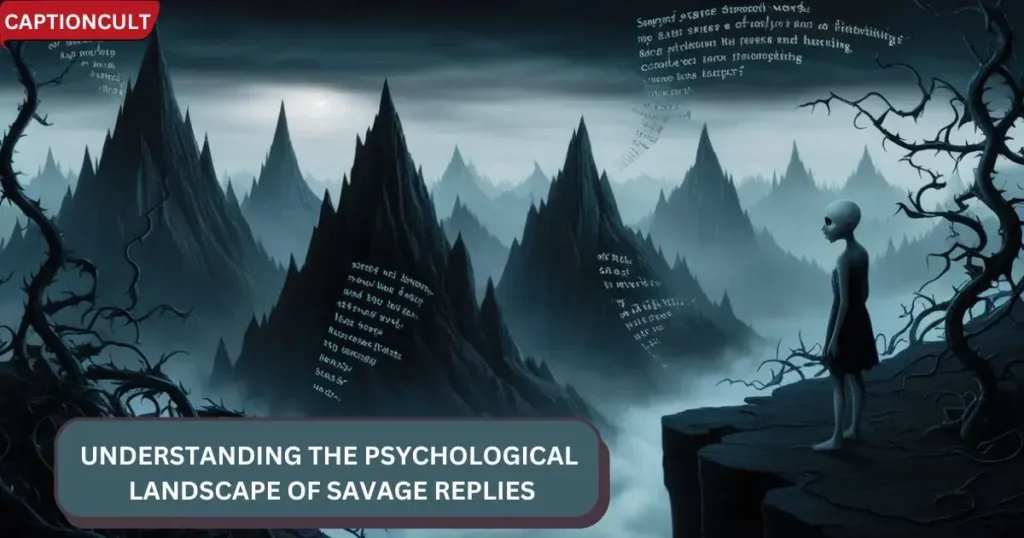
Psychological Defense Mechanisms in Responding to Insults
When faced with an insult, humans typically employ various response strategies:
- Silence: Refusing to engage
- Humor: Diffusing tension through wit
- Direct Confrontation: Addressing the issue head-on
- Savage Reply: A strategic, sharp response
The Ethics of a Savage Reply
While savage replies to insults can be powerful, it’s crucial to maintain:
- Emotional intelligence
- Respect for conflict resolution
- Personal boundaries
Additional Tips for Responding to Insults

- Stay calm: Taking deep breaths can help you maintain composure and think clearly before responding. This is especially important when dealing with bullying or harassment.
- Avoid escalating: Try to de-escalate the situation by using humor, empathy, or assertive but calm language instead of engaging in a full-blown argument.
- Use humor effectively: Humor can be a powerful tool for diffusing tension and disarming your attacker. However, make sure your humor is appropriate for the situation and your audience.
- Set boundaries: Clearly communicate your boundaries to let others know what behavior is unacceptable. If someone continues to insult you after you’ve set boundaries, consider ending the conversation or distancing yourself from them.
- Choose your battles: Not every insult warrants a response. Sometimes, the best approach is to ignore the insult and move on.
- Reflect on the situation: After the incident, take some time to reflect on what happened and how you handled it. This can help you learn from your experience and improve your response strategy in the future.
- Consider the source: Sometimes insults stem from insecurity or personal issues. Understanding the underlying reasons can help you approach the situation with more empathy.
- Practice self-care: Prioritize your emotional well-being by engaging in activities that help you relax and manage stress, especially after dealing with insults.
Frequently Asked Questions (FAQ)
Q: Is it okay to use these savage replies to insult in professional settings?
A: Generally, no. While some witty responses might work in informal settings, professional environments require more tact and diplomacy. It’s best to remain calm, professional, and assertive in the workplace. Focusing on factual corrections rather than savage replies to insult is more appropriate in professional settings.
Q: What should I do if I feel genuinely hurt by an insult?
A: If an insult has genuinely hurt you, it’s okay to acknowledge your feelings. Take time to process your emotions, and consider talking to a trusted friend, family member, or therapist. It’s important to prioritize your well-being and seek support when needed. You might consider using these savage replies to insult only when you are certain you can successfully handle the situation.
Q: Are these savage replies to insult appropriate for all ages and relationships?
A: No. Some savage replies to insult are better suited for casual relationships among peers. You should always consider the age, relationship, and cultural context before choosing a response. When dealing with family, close friends, or situations requiring more diplomacy, it’s advisable to use milder, more empathetic approaches.
Q: What if the insults continue even after my response?
A: If the insults persist, it’s crucial to establish stronger boundaries. You might need to distance yourself from the person, report their behavior if it’s bullying or harassment, or seek help from others. Remember that your safety and well-being are paramount.
Conclusion: The Art of the Savage Reply
Mastering savage replies to insults is about more than witty comebacks. Knowing how to deliver a Savage Replies To the Insult (30+ Phrases to use) can boost your confidence and help you navigate difficult social situations. It’s a nuanced form of self-defense that requires emotional intelligence, self-reflection, and strategic thinking.
Remember that choosing the right response depends on the context and your relationship with the person. Ultimately, the goal isn’t to win an argument but to maintain your composure and self-respect. Sometimes, the best response is no response at all. But when a comeback is needed, a well-chosen witty retort can be surprisingly effective.

This is a passionate author whose work explores the power of language and storytelling. With a keen eye for detail and a commitment to excellence, Julian believes that every word has the potential to create meaning and beauty. “Where Words Find Perfection” is a reflection of his dedication to crafting narratives that resonate deeply with readers.

